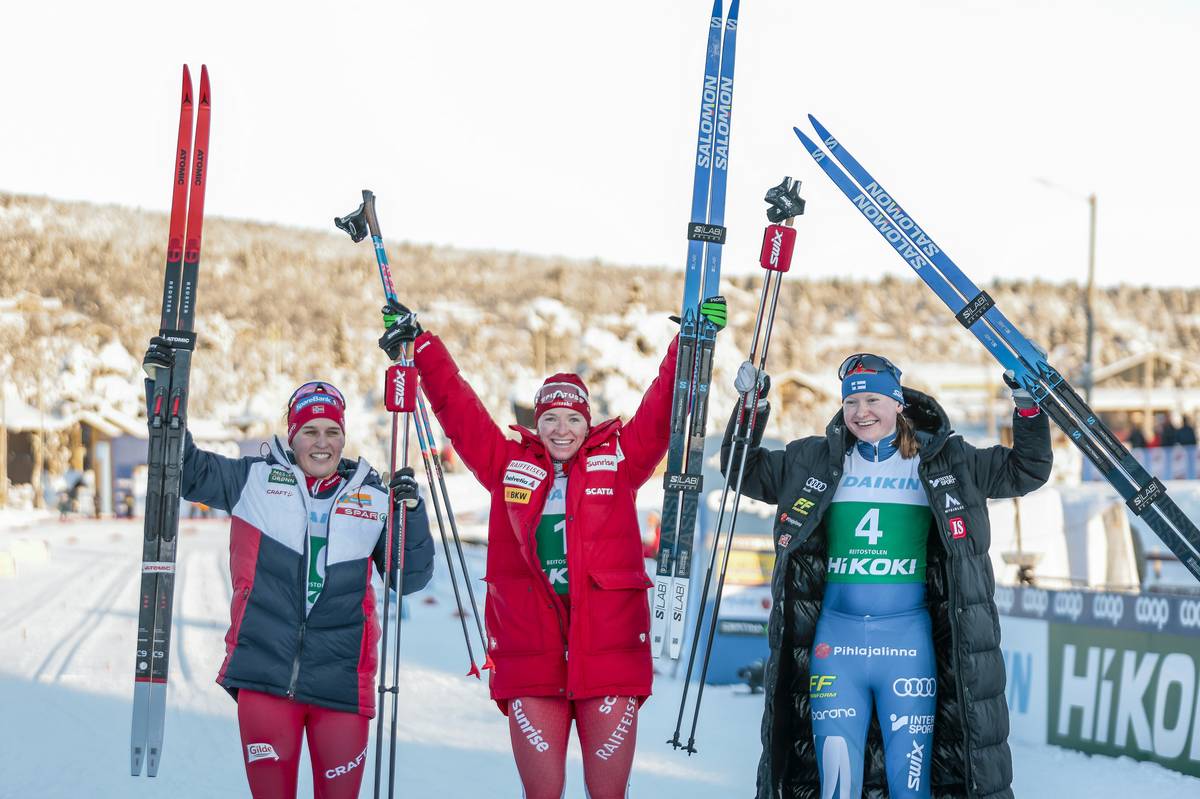
This World Cup coverage is made possible through the generous support of Marty and Kathy Hall and A Hall Mark of Excellence Award. To learn more about A Hall Mark of Excellence Award or to learn how you can support FasterSkier’s coverage please contact info@fasterskier.com.
Today, the FIS World Cup travelled to the Norwegian countryside town of Beitostolen, Norway, a three-hour drive from Oslo. It would be the first time in the hamlet’s history that it would host a World Cup Sprint event. Beitostolen (population 358) has approximately 320-kilometers of ski trails. That’s close to one kilometer of ski trail for each resident!”
The Swedish women were hoping to continue their domination and to make history today by being the first team to finish first and second three times in a row in individual sprints to start a season. Swedish women have won five of the first six World Cup events, with Jessie Diggins (USA) being the only non-Swede to interrupt the streak. Emma Ribom (SWE) was looking for a three-peat in the World Cup Sprints as she won the first two races handily.
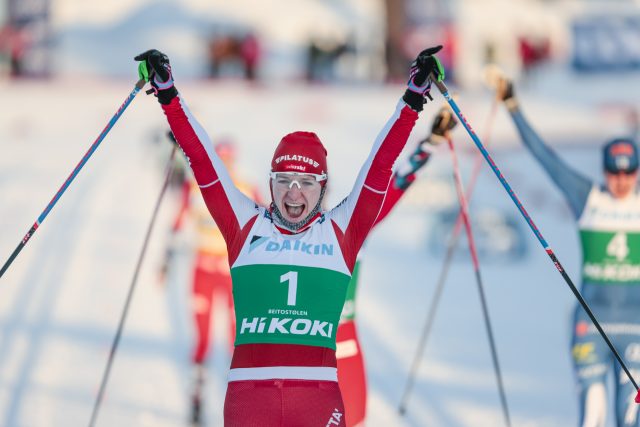
But Swedish hopes were ripped apart before the racing even began. Ribom was not feeling well Thursday and made the decision to sit out the event, and perhaps the entire weekend. Adding to Sweden’s woes was the revelation that Ebba Andersson (SWE) had tested positive for Covid, joining Anna Dyvik (SWE) on the bench for this weekend’s activities. Already missing from team Sweden was another star, Jonna Sundling, who is working her way back from illness. Over the course of a few days, Sweden had gone from high hopes of continued domination to near-desperation as their all-stars were sidelined. Opportunities for Sweden’s rivals were there for the taking if other athletes could step up.
Norway would be defending national pride—seeking redemption on home soil— after the dominant Swedish sprinters had shown no mercy to their hosts the prior weekend in Lillehammer.
Attempting to qualify for the U.S. were; Julia Kern, Jessie Diggins, Alayna Sonnesyn, Lauren Jortberg, Novie McCabe, and Rosie Brennan. This would be Brennan’s first day back after missing all of last weekend due to illness. Diggins would be gunning to join retired teammate Sophie Caldwell-Hamilton as the only non-European woman to win an individual World Cup sprint in both freestyle and classic technique.
Canada fielded Dahria Beatty and Olivia Bouffard-Nesbitt in the qualifiers.
The Results
In the qualifying rounds for the U.S. the results were: Jessie Diggins (7th), Rosie Brennan (12th), Julia Kern (17th), Alayna Sonnesyn (44th), Novie McCabe (50th), and Lauren Jortberg (56th). For the Canadians it was: Dahria Beatty (37th), and Olivia Bouffard-Nesbitt(43rd). Only the top 30 could move on from the qualifying rounds.
No North Americans qualified for the finals, which consisted of Nadine Faehndrich (SUI), Lotta Udnes Weng (NOR), Johanna Matintalo (FIN), Tiril Udnes Weng (NOR), Kristine Skistad (NOR), and Tereza Beranova (CZE). Ultimately, the Swedes could not overcome their personnel deficit and didn’t place any racers into the finals.
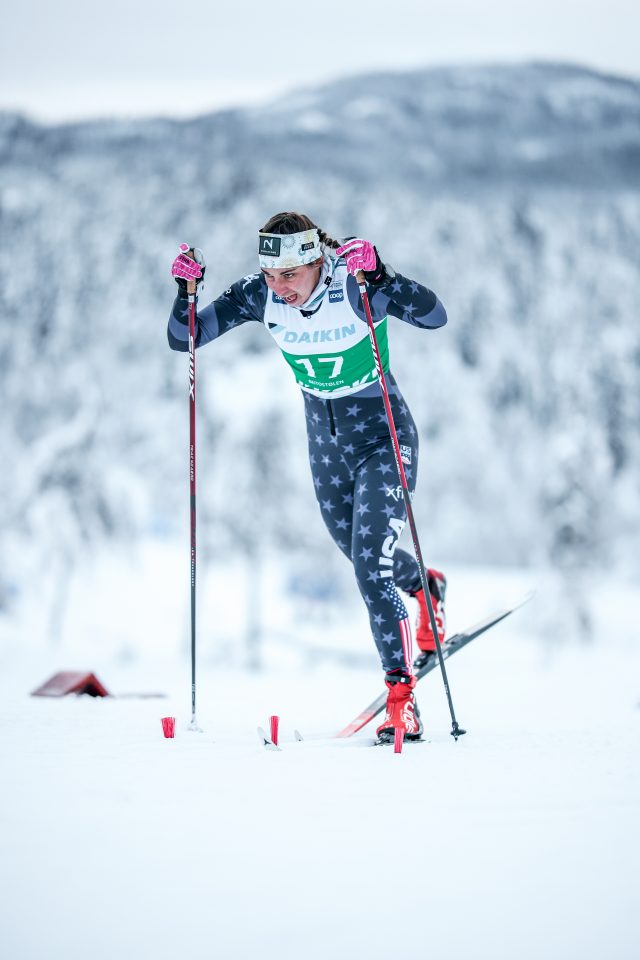
The winner of the day was Nadine Faehndrich (SUI), followed by Lotta Undes Weng (NOR), and then, Johanna Matintalo (FIN). The only American to make it to the semifinals was Julia Kern who ended up 10th overall. Rosie Brennan finished 21st, Jessie Diggins was 17th.
The Race
Julia Kern skied in fourth place through most of her quarterfinal race. She made a final surge going into the stadium and was able to double pole past two competitors to finish second.
Kern told Fasterskier that she had an early morning ski in from the team’s apartment to the venue using a headlight in the dark. “I was really excited for the heats. In the quarterfinals I picked the first heat thinking that it might be the lucky looser heat with it being a pretty stacked heat.” Kern added that there was a little arm shoving in the quarterfinal final, but that she held her own ground and was able to make a move. “I’m learning how to be physical and hold my own in the sprints.”
In her semifinal, Kern started out at the rear of the lead pack. Going into the first hill, she double poled powerfully to the front and maintained that lead going up the next steep hill. But the group pulled her back and she dropped to fourth. Coming into the stadium she charged up the last hill to keep herself in the hunt, but entering the finish stretch she was fifth and there was too much traffic for her to work through. She tried to fight through other skiers crowding the finishing lanes, but was ultimately boxed out. She finished fifth in a photo finish.
Of her positioning in the semi’s, Kern said, “I was worried about leading on the downhill, so I tried to slot in behind Johanna Hagstroem. Nadine pulled a bit of a questionable move on the inside, outside of the track between me and the V-board, where I got my pole kicked and a little bit pinched from both sides. That was my tactical error perhaps. I was feeling really good at the finish and even got out of the track to lunge hoping to make lucky loser. Every time I ski heats I learn more about tactics.”
U.S. coach Matt Whitcomb told Fasterskier that, “Julia might have made a little bit of a mistake: she skied almost flawlessly, but she hesitated into the final downhill, not wanting to lead, I think that’s something she’d like to get back.” He added that, “We’re so impressed by Julia’s ability to hit the semis three weekends in a row. When you regularly make the semis, your sprint experience doubles, and she’s becoming quickly tactically more savvy.”
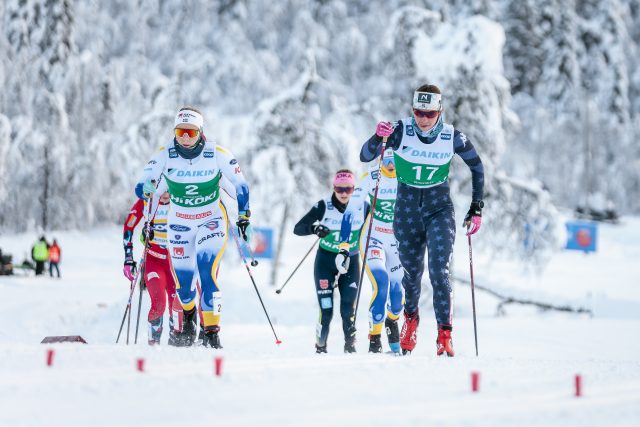
In Brennan’s quarterfinal, she came out of the start behind the rest of the field, but quickly slotted into the middle of the pack. She looked to have very fast skis as she glided up on her competition. As the race progressed, she drifted toward the back, then had to work herself around a fall by Mathilde Myhrvold (NOR). That put Brennan into fifth place: the damage had been done, and she was never able to challenge for the front. She would finished her quarterfinal in fifth place.
After the race, Brennan commented to Fasterskier: “I was happy with my qualifier after a bad sprint in Ruka and sitting out sick last weekend. The heats ended up being more technical than I had hoped and I struggled to find space and the speed I needed to advance. I was so happy to be in the heats again and to be reminded of all the little details sprinting requires to put together a good day. I’m glad to be back at it racing and am really looking forward to the 10k tomorrow.”
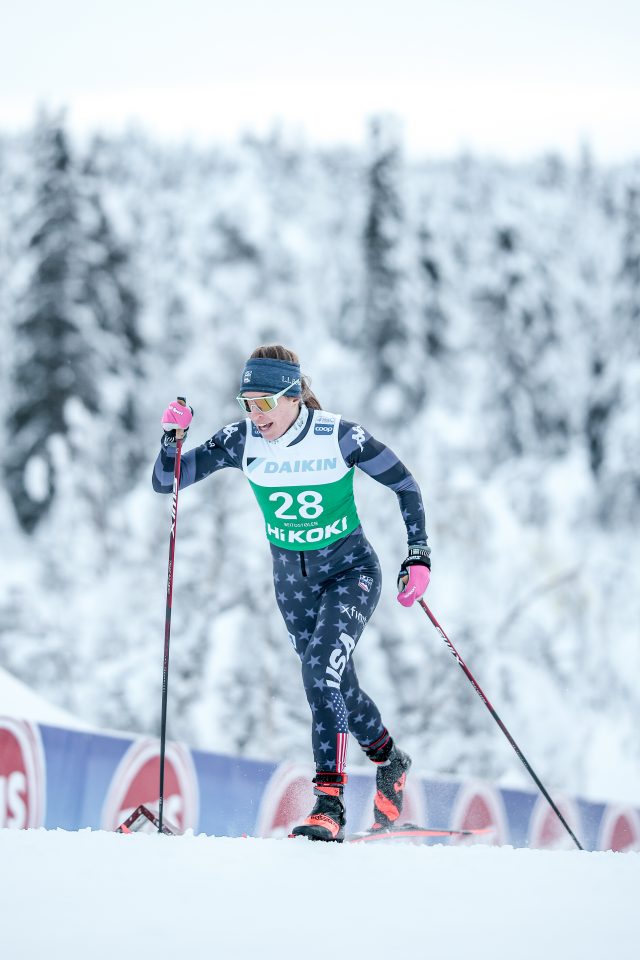
Whitcomb added that “Rosie probably still has a little rust to chip off after her illness and that it was incredibly impressive that she was 12th in the qualification.”
I’m glad to be back at it racing and am really looking forward to the 10k tomorrow. Rosie Brennan
In Diggins’ quarterfinal, she quickly went to the front to set the early pace, but she was overtaken on the first steep hill and dropped to third. Diggins was able to work herself back into second, but lost a little distance on the next steep hill and couldn’t match the pace of skiers breaking away at the front. She double poled hard to the finish, but ultimately finished fourth; not fast enough for a lucky loser position. Her day would end in the quarterfinals.
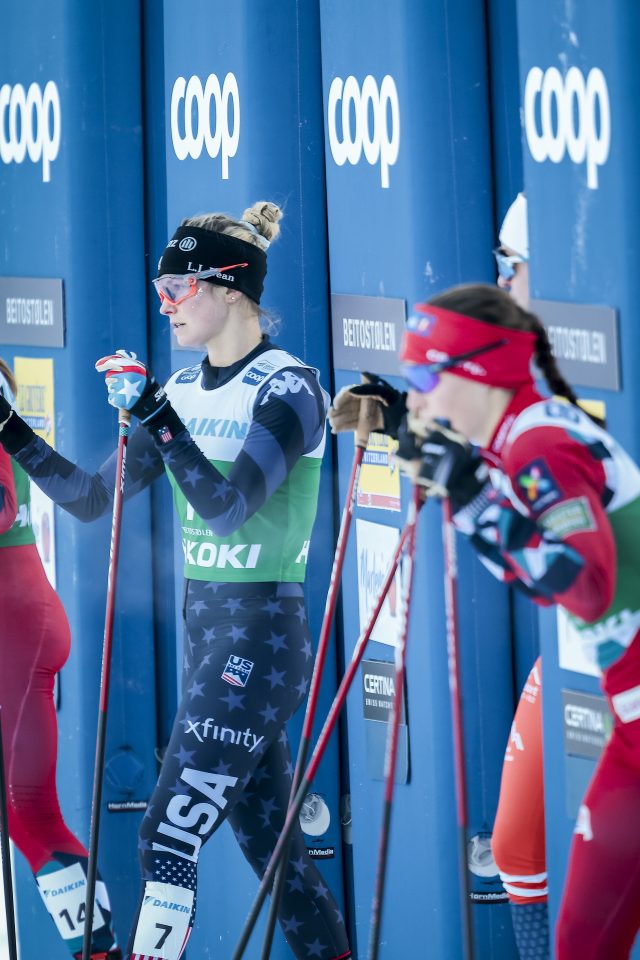
Diggins commented to Fasterskier that “[My] strategy was to get off to a fast start and be in the front, as it’s a tough course to pass on if you’re stuck in the back or boxed in, and I wanted to try to stay ahead of any crashes or tangle-ups.”
Diggins added that, “The day felt really fast and that [my] speed and kick . . . felt really good. I didn’t think I skied all that well in the heat, but I learned a lot of things and am excited to put that energy forward into tomorrow’s 10K race.”
For the American women, it was a day of near misses as so often happens in sprint racing. All the women who made the heats appeared strong enough to advance, but Beitostolen proved to be a very fast course and tactics counted today as much as speed. Things easily could have gone their way with a few minor changes. U.S. coach Matt Whitcomb told Fasterskier that, “It was a fast sprint, and if you came into the final hill with legs and in the front of the pack, you had a good chance of advancing. If you were in the back, it was very difficult to advance.”
Whitcomb had praise for the U.S. team’s travel setup: “We’re living in apartments, cooking our own food. It’s a great setup for us where we just walk or ski to the venue.”
Whitcomb also spoke very highly of the contribution from the second fellowship the team has had from the Trail to Gold. Once again, the U.S. team was able to fill the two bibs reserved for female coaches with Annika Martell from Williams College filling one of those roles. Each Trail to Gold Fellow will receive a grant to complete a two-week immersive internship with the US Ski Team this World Cup season.
